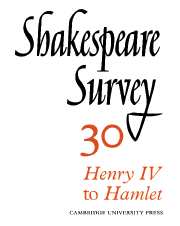Book contents
- Frontmatter
- ‘Henry IV’ and ‘Hamlet’
- Prince Hal and Tragic Style
- The True Prince and the False Thief: Prince Hal and the Shift of Identity
- Falstaff, the Prince, and the Pattern of ‘2 Henry IV’
- Whatever Happened to Prince Hal?: An Essay on ‘Henry V’
- ‘Henry V’ and the Bees’ Commonwealth
- ‘All’s Well that Ends Well’
- ‘Hamlet’ and the Power of Words
- Hamlet the Bonesetter
- ‘Hamlet’: A Time to Die
- Shakespeare, Lyly and Ovid: The Influence of ‘Gallathea’ on ‘A Midsummer Night’s Dream’
- Making a Scene: Language and Gesture in ‘Coriolanus’
- Freedom and Loss in ‘The Tempest’
- Inigo Jones at The Cockpit
- Theory and Practice: Stratford 1976
- The Year's Contributions to Shakespearian Study 1 Critical Studies
- 2 Shakespeare’s Life, Times, and Stage
- 3 Textual Studies
- Index
- Plate Section
‘Hamlet’ and the Power of Words
Published online by Cambridge University Press: 28 March 2007
- Frontmatter
- ‘Henry IV’ and ‘Hamlet’
- Prince Hal and Tragic Style
- The True Prince and the False Thief: Prince Hal and the Shift of Identity
- Falstaff, the Prince, and the Pattern of ‘2 Henry IV’
- Whatever Happened to Prince Hal?: An Essay on ‘Henry V’
- ‘Henry V’ and the Bees’ Commonwealth
- ‘All’s Well that Ends Well’
- ‘Hamlet’ and the Power of Words
- Hamlet the Bonesetter
- ‘Hamlet’: A Time to Die
- Shakespeare, Lyly and Ovid: The Influence of ‘Gallathea’ on ‘A Midsummer Night’s Dream’
- Making a Scene: Language and Gesture in ‘Coriolanus’
- Freedom and Loss in ‘The Tempest’
- Inigo Jones at The Cockpit
- Theory and Practice: Stratford 1976
- The Year's Contributions to Shakespearian Study 1 Critical Studies
- 2 Shakespeare’s Life, Times, and Stage
- 3 Textual Studies
- Index
- Plate Section
Summary
If the first law of literary and dramatic criticism is that the approach to a work should be determined by the nature of that work, then I take courage from the fact that Hamlet is a play in which, in scene after scene, fools tend to rush in where angels fear to tread. That such fools also tend to come to a bad end - to be stabbed behind the arras or summarily executed in England,' not shriving-time allowed' - I prefer at this point not to consider.
The area into which I propose to rush is the language of Hamlet,. The method of entry is eclectic. If there is any timeliness about the rush it is that - just as ten years or so ago King Lear was Our Contemporary - Hamlet is now coming to the fore as one of the inhabitants of No Man's Land. A recent book on Shakespeare's Tragic Alphabet speaks of the play being about 'a world where words and gestures have become largely meaningless', and even as long as twenty-five years ago an article on 'The Word in Hamlet’began by drawing attention to 'the intensely critical, almost disillusionist, attitude of the play towards language itself'.
- Type
- Chapter
- Information
- Shakespeare Survey , pp. 85 - 102Publisher: Cambridge University PressPrint publication year: 1977
- 2
- Cited by

